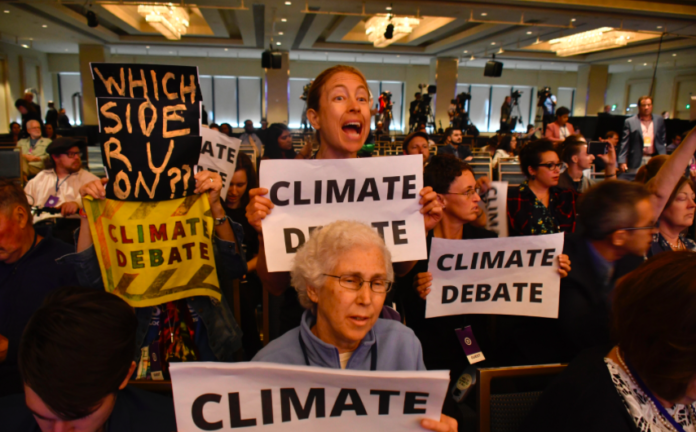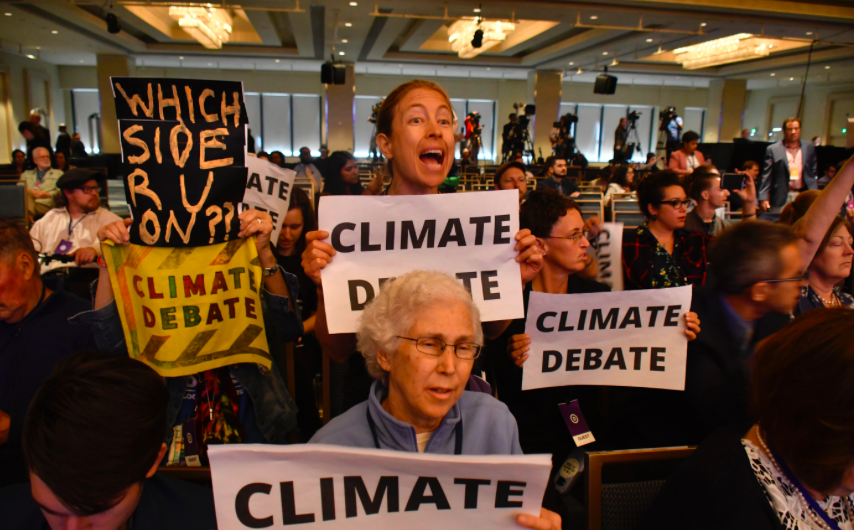
As the Amazon rainforest blazed into blackening skies in Brazil, further intensifying the climate crisis, activists’ months-long push for a Democratic Party presidential debate focusing on humanity’s most existential threat went down in flames Saturday.
Contradictions thundered through the packed auditorium of the Hilton Hotel in downtown San Francisco. Party chairman Tom Perez and other stalwarts voiced the importance of climate change even as they blocked the presidential climate debates, while climate activists chanted, “we can’t wait!” and “the whole world is watching!”

After multiple votes, fiery debates, behind-the-scenes wrangling, and amendments, Democratic Party leaders denied the climate debate push by a 222-137 vote—rejecting a compromise that would simply allowed presidential candidates to hold their own climate debate without being penalized by the Democratic Party.
Most major Democratic Party presidential candidates have either called for or agreed to join a climate debate. Now, instead of a prime-time climate debate sanctioned by the DNC, there will be two televised climate “forums” that may draw less viewership and less focused policy debate.
As Perez emphasized the town hall forums on climate as an improvement from “about zero debate of climate change in 2016,” activists shouted back, “then debate it!” Critics point out that the town hall events will draw far smaller audiences than official presidential debates, where candidates would be forced to detail their policy differences.
Scientists worldwide warnthat we have only 10 to 12 years to avert or ameliorate irreversible climate catastrophe, and that such a move will “require rapid, far-reaching and unprecedented changes in all aspects of society,” the Intergovernmental Panel on Climate Change explained in 2018.
A climate debate would force candidates to explain how they would meet the challenges as the science demands, and to detail their positions beyond basic platitudes. While all the Democratic candidates acknowledge the climate crisis, there are major distinctions for voters to consider. Which candidates would challenge the economic and political power of the fossil-fuel industries? Which candidates would tax corporate profits and wealth to create millions of jobs to decarbonize the economy and require 100 percent renewable energy as the climate demands?
“I’m confident that our forums on climate change are a down payment on this issue, because it is very, very important,” Perez told the crowd. Perez and other opponents of the climate debate insisted there are far too many important concerns to hold a “single issue” climate debate.
Help us save local journalism!
Every tax-deductible donation helps us grow to cover the issues that mean the most to our community. Become a 48 Hills Hero and support the only daily progressive news source in the Bay Area.
“We’ve heard from many groups wanting single issue debates,” said Perez, from voting rights and campaign finance reform, to labor rights — “all these issues are compelling.”
But climate debate advocates rejected pitting critical issues like labor and racial justice against climate change, insisting the climate crisis is “intersectional,” as so many victims of this environmental catastrophe are indigenous, people of color, and the working class of all races.
Many elected DNC representatives strenuously rejected Perez’ framing of the climate debate as a single issue competing with other major issues like racial justice, jobs, or gun control.
“Climate isn’t a single-issue debate,” said Washington State Party Chair Tina Podlodowski,lead author of the climate debate resolution. “It’s about our young people, our union members, it’s about our survival on the planet. The Amazon is burning today. What we are asking today is simply that there be no penalty for appearing in an unsanctioned debate. We are hearing from grandmothers, from communities of color.”
Travis Nelson, an elected DNC representative from Portland, Oregon who authored a climate debate resolution that was defeated, argued, “I don’t see any reason why we can’t have a substantive debate on climate change and three or four issues important to Democrats, giving them equal time, being sure they intersect.”
Christine Pelosi, a DNC delegate and daughter of House Speaker Nancy Pelosi, urged, “the climate crisis is not a single issue, it’s an existential cause. Young people are knocking on the door.” Asked why she thought the leadership resisted a climate debate, Pelosi — who originally proposed a series of debates based on major platform issues — responded, “they like power and control and they don’t want to give it up.”
As it became clear the DNC would reject the climate debate, while Perez spoke, a group of climate activists with Shahid Buttar, a congressional candidate running to unseat Rep. Pelosi, stormed out of the hall and into the streets, chanting “failure of leadership! Failure of leadership!”
Interviewed just after the proceedings, Wyoming DNC Delegate Jessica Chambers expressed disappointment and outrage. “What’s going on with climate change is racism — it’s privilege in action, the rest of the world understands this. You’d think the Democratic Party would be able to tell voters this is the number one issue.”
Chambers, who was elected in 2016 as an insurgent running against superdelegate control, likened the climate debate defeat to the Perez DNC leadership’s reversal of a ban on fossil fuel money. “When half the people on these committees are corporate lobbyists, it’s so frustrating.”
In August 2018, a Perez-backed DNC measurereversed the ban on fossil fuel industry campaign donations — just two months after the DNC had agreed to stop taking money from oil, gas, and coal industry interests.
Asked why party leaders are blocking the climate debate, longtime Democratic Party activist Karen Bernal, who has held high-level posts in the California Democratic Party, emphasized short-term economic and campaign thinking. “They are going to go down with the ship. It’s short-term, neoliberal imperative versus our survival. They are bought and bossed. What more do they need when they hear that Alaska has lost all its ice?”
Many critics pointed to the Democratic Party’s ties to corporate money and Wall Street to explain the resistance to a climate debate. Norman Solomon, co-founder and national coordinator of RootsAction, explained, “it’s not that they can be bought for X amount of dollars — it’s their relationships with Wall Street and the big banks.”
Now, said Solomon, the push for climate debates and action “is going to be completely dependent on grassroots pressure. I think there will be some bad ripple effects. It sends a bad message, especially to young people who would vote overwhelmingly Democratic. We need to raise hell about this.”
In a touch of irony, earlier in the day a DNC video commemorating the life of longtime party activist and delegate Frank LaMere, who died this past June, ended with his quote: “nothing changes until someone is made to feel uncomfortable.”
Despite the setbacks, climate activists like the Sunrise Movement vow to keep the pressure on. The DNC leadership “ignored millions of voters & shut down a #ClimateDebate,” Tweeted Sunrise leader Varshini Prakash. In an email, Prakash wrote, “The call for a climate debate had the support of the majority Democratic voters–the very people the DNC is supposed to represent.”
But, Prakash added, “our fight for a debate was anything but a loss — & the work continues.” If nothing else, activists forced Democratic Party leaders to discuss the central importance the climate crisis.
Activists are still calling on presidential candidates to hold their own climate debate, regardless of any DNC sanctions or penalties.
On both climate and political terms, the clock is ticking fast.
Next up on the climate action push is the Sept. 20 global climate strike to pressure far more sweeping action to meet what science says is urgently necessary. As activists describe on their organizing website: “millions of us will walk out of our workplaces and homes to join young climate strikers on the streets and demand an end to the age of fossil fuels…Our house is on fire — let’s act like it.”

